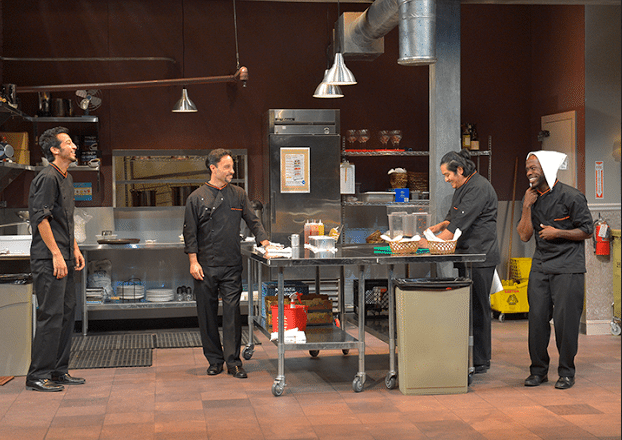By Charles Brousse
For the first 80 minutes of its 90-minute running time, Marin Theatre Company’s (MTC) Bay Area premiere of Elizabeth Irwin’s My Mañana Comes provides a strikingly realistic portrait of what the workaday routine is like for four men who are struggling to survive in New York City on the lowest rung of the restaurant job ladder. Being dependent on minimum wages and a share of tips isn’t easy.
These men are fully grown adults. Two of them have families to support. Most of them seem capable of doing greater things. Yet, you and I call them “busboys” and we hardly notice when they come to clear the table, or refresh our glass of water.
This is their story, one the program tells us Irwin knows first-hand because of her extensive experience in the foodservice industry before turning to a career in theater. She says she wrote the play to draw attention to these nearly invisible people who, despite adversity, manage to find humor and camaraderie in everyday living. Above all, they never let go of their dreams. Instead, their attitude seems to be Yes, today may be bad. We may suffer indignity and threats to our income, but at least we have a job, and when mañana comes … !
Though the script sometimes verges on being static and repetitive (always a danger in slice-of-life naturalistic drama), Irwin’s skill at writing realistic dialogue and the detail with which she develops each character combine to draw us ever deeper into their world. In no small measure, it is also due to the fact that MTC director Kirsten Brandt has assembled a superb cast who seem born to their roles.
Peter, the group’s unofficial leader, is portrayed with enormous physical and emotional energy by Shaun Patrick Tubbs. He’s an African-American who is intimately familiar with the challenges of competing in a white-dominated society (including the restaurant owners), but is undaunted by them and remains determined to earn enough to move his wife and children out of the dangerous Harlem neighborhood where they currently reside.
Eric Avilés is Jorge. Serious and hardworking, for four years he has been quietly bussing dishes, slicing lemons, cleaning and doing the other chores demanded of back-of-the-house workers, all the while saving every penny he can so that he can eventually return to his family in Puebla, Mexico, where he plans to build a comfortable large casa.
Caleb Cabrera’s Whalid is a gangly, loose-jointed, third-generation Mexican-American kid who is still living with his parents in Brooklyn. Constrained by financial needs from enjoying the flamboyant life he yearns for, he has no particular loyalty to, or interest in, his restaurant job other than seeing it as a stepping stone to eventual personal freedom.
Finally, Carlos Jose Gonzales Morales is Pepe, naïve in the extreme, having arrived in this country from Juarez only a few months before he is entranced by the vision of prosperity that it offers. Now, he yearns to earn enough to bring his brother to New York to share the riches with him.
The busboys are what playwright Irwin calls a “band of brothers.” But for all their comradeship, there is one vital distinction: Peter and Whalid are native-born American citizens; Jorge and Pepe are illegal immigrants. When management decides to cut their shift pay and Peter advocates going on strike in response, that difference in status creates a chasm that no amount of moral handwringing can overcome.
That shift in focus from the plight of low-level workers to illegal immigration comes in the play’s last 10 minutes. I won’t reveal how it is resolved except to say that it likely will divide audiences as well.
NOW PLAYING: My Mañana Comes runs through November 22 at Marin Theatre Company, 397 Miller Ave., Mill Valley; 415/388-5208; bo*******@ma**********.org.











